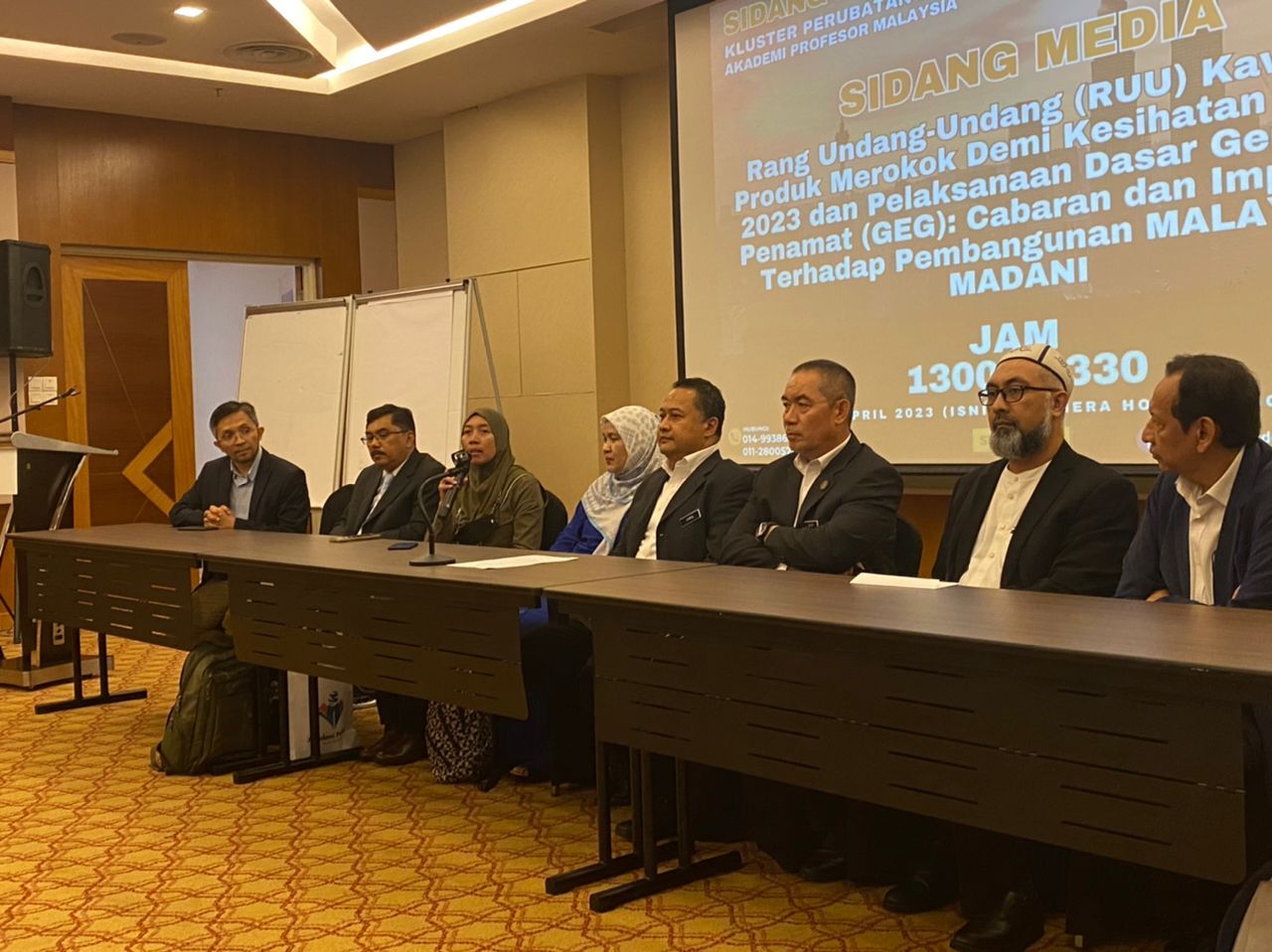BANGI, April 17 – A group of prominent health experts in Malaysia has issued a ‘Bangi Declaration’ outlining 10 key recommendations to strengthen tobacco and vape control measures in the country, in response to the government’s decision to remove nicotine liquids and gels from the Poison Act 1952.
The declaration, presented at a roundtable conference on the Control of Smoking Product for Public Health Bill 2023 and the Generational Endgame (GEG) policy today, proposes an immediate review of the exemption of nicotine liquids and gels from the Poisons Act, a minimum tax rate of 65 per cent on all tobacco products, and the introduction of regulatory controls on the marketing, pricing, and taxation of vape, similar to tobacco and cigarettes.
The Bangi Declaration also includes a recommendation for the National Fatwa Council to declare all tobacco products, including e-cigarettes, as haram (forbidden), and for this fatwa to be enforced in all states.
E-cigarettes have been declared haram by the National Fatwa Council since 2015. However, it is unclear how many states have since adopted and implemented the fatwa since Islamic law falls under state jurisdiction. Berita Harian previously reported that Kedah, Penang, and Johor have issued fatwa at the state level to declare e-cigarettes or vape as haram.
The Bangi Declaration further proposes the prohibition of e-cigarette sales within a 5km radius of all educational institutions and residential areas.
According to the group, all tobacco products, including nicotine, are considered “poisonous” and pose a serious risk to public health. Tobacco products also place a considerable financial strain on the Ministry of Health (MOH) in terms of health care management, the group added.
Experts at the roundtable conference say that implementing these measures is crucial to achieving the World Health Organization’s (WHO) goal of reducing smoking rates to below 5 per cent by 2040. The Bangi Declaration was addressed to Prime Minister (PM) Anwar Ibrahim.
When asked about the possibility of the panel taking legal action in the form of a judicial review if the government does not promptly review the delisting of liquid nicotine, Prof Dr Cairul Iqbal Mohd Aiman, a professor in pharmaceutics at Universiti Kebangsaan Malaysia (UKM) who read out the declaration during a press conference today, stated, “Let’s give the chance for the government to review first, and then we will cross the bridge when we reach there.”
Dr Cairul Iqbal mentioned that the panel had requested to meet with the PM last week, but had yet to receive a response. “With the press conference today, we hope to bring our concerns to the attention of the PM and receive a prompt response.”
The 10 recommendations in the Bangi Declaration are:
- To conduct an immediate review of the government’s decision to remove nicotine from the Poisons Act 1952 until the Control of Smoking Product for Public Health Bill 2023 is passed.
- To impose an effective minimum tax rate on all tobacco products, especially cigarettes, of 65 per cent as recommended by the WHO.
- To impose taxes, pricing regulations, and marketing controls on all electronic cigarette liquids, similar to tobacco and cigarettes, and to set the maximum nicotine concentration allowed on the market based on the amount of nicotine (mg/ml).
- To ensure the country is committed to achieving the “Tobacco Endgame” target as suggested by the WHO, which is a smoking prevalence of less than 5 per cent by 2040.
- To combat corruption and border smuggling to address tobacco product smuggling issues, including electronic cigarettes.
- To impose special licences on electronic cigarette premises and sellers and to prohibit the sales of e-cigarettes within a 5km radius of all educational institutions and residential areas.
- To provide a special grant to conduct research on electronic cigarettes, including their health, economic, and social effects, especially on women and children, open to all public and private institutions.
- To ensure the effectiveness and safety of electronic cigarettes before registering them for the purpose of harm reduction of conventional cigarettes through the National Pharmaceutical Regulatory Agency (NPRA).
- To ensure the interests and child-friendly practices of women and families are always maintained and protected from the use of cigarettes and electronic cigarettes.
- To gazette a fatwa that declares all tobacco products, including cigarettes and electronic cigarettes, as haram (forbidden) by the National Fatwa Council and to enforce it in all states.
The roundtable, hosted by Akademi Profesor Malaysia, comprises prominent individuals such as health economist Prof Dr Syed Mohamed Aljunid and Prof Dr Mohamad Haniki Nik Mohamed, chief coordinator of the Certified Smoking Cessation Service Provider (CSCSP) at International Islamic University Malaysia (IIUM).
Additionally, representatives from various organisations including the Malaysian Pharmacists Society (MPS), the Malaysian Medical Association (MMA), the National Council of Women’s Organisations Malaysia (NCWO), the Malaysia Public Health Specialist Association, and the National Kidney Foundation Malaysia, among others, are also part of the roundtable.








